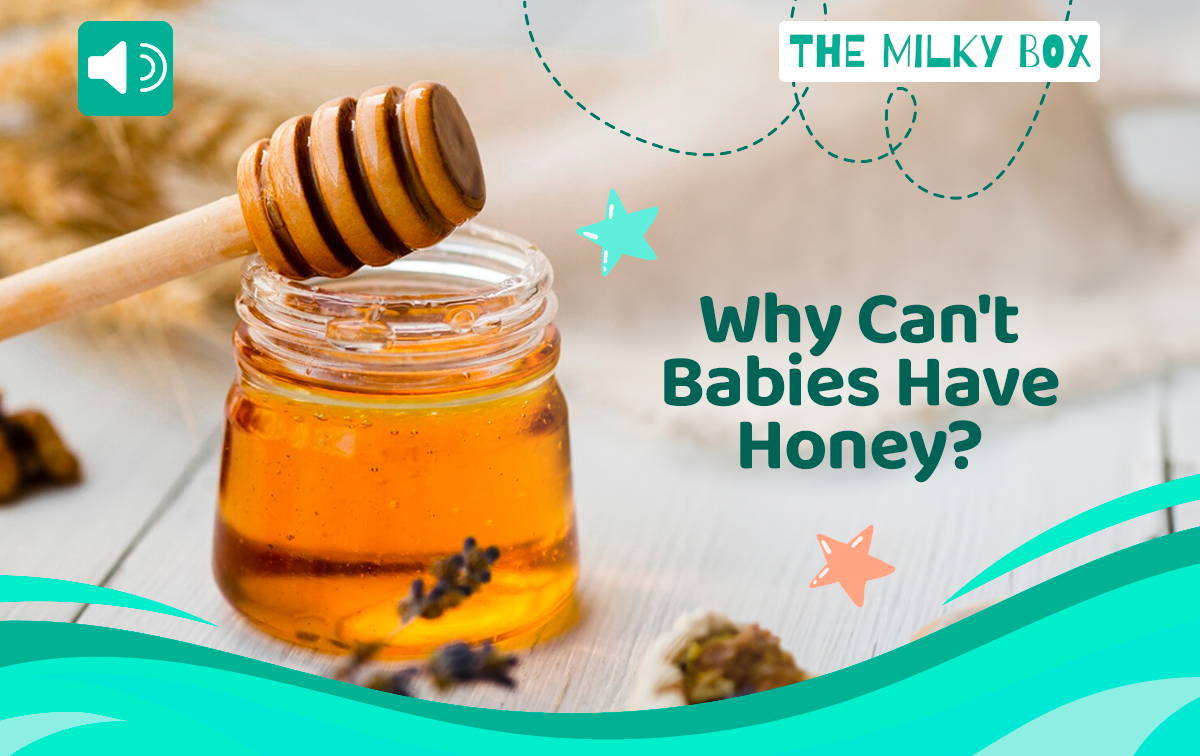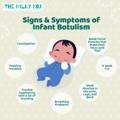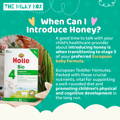Yes, it is ok for a breastfeeding mother to eat honey. Botulism is not transmitted by breast milk.
Why Can't Babies Have Honey?
By: Suzanne Renee' - Updated April 20, 2024 - 5 Minute Read

Adding solid foods to your baby's favorite European baby formula diet is an exciting and important milestone. Navigating the world of new baby foods can be complex as families learn which food can be dangerous. Some foods are best to avoid in the first year.
When introducing solids, you will learn about foods that are initially off-limits, including choking hazards and potential allergens. Unlike these food restrictions during infancy, honey falls in a completely different class.
In this article, let’s take a closer look at the extreme hazard of this popular sugar substitute and learn when the best time is to introduce this natural sweetener.
Table of Contents:
1. Why Should Babies Not Have Honey?
2. What Causes Infant Botulism?
3. What Are the Signs & Symptoms of Infant Botulism?
4. How Is Infant Botulism Diagnosed?
5. How is Infant Botulism Treated?
6. How Can I Protect My Baby from Infant Botulism?
7. When Can I Introduce Honey?
8. Nutritional Information about Honey
9. Why Babies Can’t Have Honey?
Why Should Babies Not Have Honey?
We can easily say that babies younger than 1-year-old should not be given honey. The main threat of this well-known sweetener is a type of bacteria (called Clostridium) that causes infant botulism.
What Causes Infant Botulism?
Clostridium botulinum bacteria can live on surfaces like carpets and floors and contaminate honey. The good news is as your infant's digestive system matures; this pathogen becomes harmless.
Infant botulism is most detected in babies three weeks to 6 months old but remains risky until their first birthday. According to the World Health Organization (WHO), most adults and older children have developed natural defenses that prevent the growth of C. botulinum in their intestines.
What Are the Signs & Symptoms of Infant Botulism?
Babies with infant botulism might show indications of worries from slight to severe, from constipation to breathing troubles.

How Is Infant Botulism Diagnosed?
Check with your healthcare provider immediately if you notice these conditions in your little one. Doctors diagnose infant botulism by asking detailed questions about the symptoms and will conduct an exam.
A stool or enema specimen is required to diagnose infant botulism in the digestive system. Further tests may be performed to find the severity of your little one’s muscle weakness.
How is Infant Botulism Treated?
Antibiotics do not help infant botulism and are unnecessary unless a secondary bacterial infection is present. The primary treatment for infantile botulism is an intravenous drug called botulism immune globulin. This treatment reduces hospital stays and results in less severe illness.
However, the infant may need several weeks to recover and receive special care and attention. Treatment will include proper nutrition and, in some cases, support of a breathing machine.
How Can I Protect My Baby from Infant Botulism?
It is relatively simple, the only known preventive measure for infant botulism is to avoid feeding honey to infants 12 months of age or less.
By not giving their baby honey or any processed foods or drinks that contain honey, like honey graham crackers or sweet teas with honey, until after their child's first birthday, contamination and risk are close to zero.
It is essential to avoid honey jars that claim to have been pasteurized since this process still can't reliably remove all the bacteria.
When Can I Introduce Honey?
Pediatricians recommend waiting until your baby is at least 12 months before introducing honey. After one year, your little one’s immune and digestive systems will have matured, and they will be ready to be introduced to this healthy sugar alternative.

Nutritional Information about Honey
It is worth mentioning that because honey is a natural sweetener, many families look to this “healthy alternative to sugar” to add sweetness to their toddler’s meals.
However, to benefit from these nutrients, you must eat far more honey than is healthy. Organic toddler milk, simple ingredients infant porridge, and whole food nutrition are perfect complements to ensure a balanced diet.
The American Academy of Pediatrics recommends that families aim for less than 25 grams (about six teaspoons) of added sugar (including honey) per day for children two years of age and older and avoid serving food and drinks with added sugar to children under two years of age altogether.
Why Babies Can’t Have Honey?
Infant nutrition is not always easy to navigate. It is good to know that for all little ones from birth through the toddler years, The Milky Box has allergen-free and sugar-free powdered baby formulas for all stages and developmental needs.
Your baby’s current and future health is our top priority.
Frequently Asked Questions
Is it ok for a breastfeeding mother to eat honey?
My infant was fed honey. What should I do?
The good news is not every honey jar has botulinum spores. To date, avoiding feeding honey to infants 12 months of age or less is the only known prevention measure for infant botulism.
If, in the next few weeks, you believe your infant is exhibiting the signs and symptoms of infant botulism, please reach out to your pediatrician.
Are there any long-term consequences of infant botulism?
In the absence of hospital-required severe complications, no. The prognosis for infant botulism patients is complete recovery.
Disclaimer:
Please be aware that this information is based on general trends in babies, and it is not medical advice. Your doctor should be your first source of information and advice when considering any changes to your child’s formula and when choosing your child’s formula. Always consult your pediatrician before making any decisions about your child’s diet or if you notice any changes in your child.
Breastfeeding is the best nutrition for your baby because breast milk provides your child with all the essential nutrients they need for growth and development. Please consult your pediatrician if your child requires supplemental feeding.

Suzanne Renee' is an accomplished professional with extensive expertise in the area of infant nutrition, dedicated to promoting the health and wellbeing of children. She started this journey as a foster parent. Suzanne has emerged as a strong proponent of the European baby formula and has become a full time writer of the subject. In her free time, she enjoys camping, hiking and going to church.
Read Next:
Reviewed by Dr. Eric Wood, ND, MA

Dr. Wood is a licensed naturopathic doctor, with a doctorate degree from the Canadian College of Naturopathic Medicine in Toronto, Canada. He received his post-graduation certification in Mind Body Medicine at Harvard University.
With 15 years of experience, Dr. Wood is an Associate Professor of Holistic Nutrition at the American College of Health Sciences in Portland, Oregon. Dr. Wood is an educator, clinician, author, media figure, consultant, and owns his own holistic (naturopathic) medical practice in Ft. Lauderdale, Florida. Dr. Wood is currently researching and drafting books on cancer and pediatrics.
Outside of the medical profession, Dr. Wood loves singing with the Miami Lyric Opera and is an avid musician in South Florida. He also loves spending time with his wife and kids.

